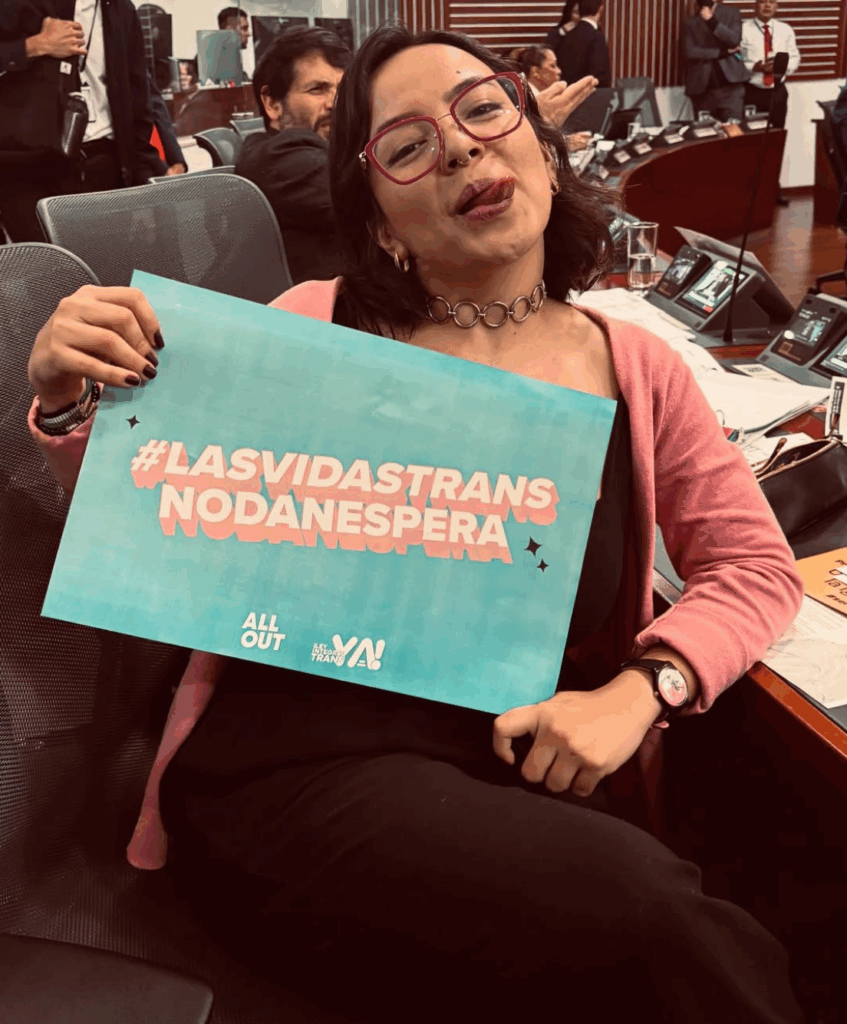Medellín, Colombia – Colombia’s Congress on June 3 approved the presentation of the Comprehensive Trans Law, considered one of the most “robust” pieces of legislation on the subject in the world, as per newspaper El País.
Legislators are seeking to establish a legal framework that guarantees the fulfillment of the gender-diverse populations’ rights through the elimination of “all forms of injustice, exclusion, discrimination and violence in both the private and public spheres,” according to the bill.
The legislation defines terms like gender identity, sex assigned at birth, gender expression, and gender fluidity, and mandates the absolute prohibition of gender-based discrimination, measures to protect gender minorities, and the inclusion of the “gender identity” category in all the National Administrative Department of Statistics (DANE) information-gathering systems with the purpose of collecting official data on the country’s gender-diverse population.

Image source: Jennifer Pedraza via Instagram.
Other clauses include the requirement that all public servants integrate a gender-diverse approach to their work; the establishment of the right to gender identity; that the process of issuing accurate legal identification documents takes no more than one month; and the addition of the “Non-Binary” (NB), Trans or Travesti (T) variables to IDs, when appropriate.
Initially, the bill was promoted by 41 representatives and senators, and was drafted following consultations with over 1,300 transgender, transvestite, and non-binary individuals across 24 of Colombia’s 32 departments.
The survey these individuals responded to sought to identify the gender-diverse populations’ needs and opinions on how Colombia can create a more inclusive and protective legislation. As highlighted by Congress, the country has been signaled in recent years by the Regional Network on Information about LGBTI Violence as having the highest LGBTIQ+ murder rate in Latin America.
“Throughout history, we have not been guaranteed medical services or safety. They have persecuted us without justification, and our rights have been endangered, but we believe that from now on, everything will change,” Slendy Matiz, a transgender woman, noted before Congress in mid-August 2024.
The bill has been met with criticism.

Image Source: Katerin Romero via Instagram.
“This is not a civil rights project. This is a radical, transversal and mandatory reform that seeks to redefine the judicial, educational, sanitary, economic, cultural, religious, and family models in our nation. It does not seek to protect; it imposes a unique ideological vision based on self-perceived gender identity as a new legal supreme ordinance category,” Katerin Romero, spokesperson for the pro-life Nazer Foundation, stated at the proceedings.
The passing of the Comprehensive Trans Law presentation marks great progress, as other bills relating to LGBTQ+ rights have been archived due to time limitations. In April, newspaper El País warned that Congress had two months left to “save” the bill, “a golden opportunity to react to the transfemicide of Sara Millerey.”
The April 4 murder of Millerey, a transgender woman, happened in the northern Antioquian municipality of Bello, close to Medellín. According to the BBC, Millerey was attacked by a group of men who broke her arms and legs before throwing her body into a nearby stream, where she ultimately drowned following a two-hour-long struggle against the water currents.
The case sparked nation-wide outrage as videos of her brutalization went viral on social media, picturing her distress as she was carried downstream. Millerey was ultimately rescued by the municipality’s fire department, who responded to calls from concerned neighbors, although she passed away hours later at a hospital.
“She was a victim of an outrageous and hateful act. Sara’s arms and legs were broken, and she was thrown to the river. It hurts to think that people were indifferent to this. We cannot allow transphobia to keep silently costing us the lives of so many,” Bello mayor Lorena González Ospina stated at the time.

Image Source: Radio Nacional de Colombia
The trend of violence has been persistent. From January to May 2024, Colombia’s ombudsman registered 286 cases of violence against gender-diverse individuals, and from January 1 to May 6, 2025, 36 LGBTIQ+ individuals were murdered in the country, as per official data from the Prosecutor’s Office.
On May 9, the Organization of American States (OAS) urged the Colombian government to take drastic measures to eradicate violence against LGBTIQ+ populations, although on May 22, transgender activist Nawar Jiménez was also murdered, this time in the northern department of Bolívar.
According to Colombian newspaper El Tiempo, one of the most pressing issues which the Comprehensive Trans Law addresses is the difference between official State data and that compiled by NGOs.

Image Source: César García Garzón via X.
As found by the newspaper’s investigators, whereas the Colombian Prosecutor’s Office registers 3,322 homicides of individuals identified as members of a diverse community between 2010 and 2025 — 431 of which allegedly happened in 2024 –, NGOs note a lack of investigative rigor and attributed 164 murders to 2024. These sorts of gaps, NGO Caribe Informativo argues, are not only evident in homicide rates, but also in rates of sexual violence, discrimination, and domestic violence.
Although the Comprehensive Trans bill recognizes and is set to address these institutional shortcomings, it must still be approved by various legislative channels before it becomes a law. Following its presentation’s success, it must now go through the Chamber of Representatives’ plenary session for a second debate, after which it will be remitted to the Senate. It must then be approved in two debates, altered if necessary, and submitted to the Executive branch for the president’s signature.
In the meantime, however, Colombia must still deal with an average well over 160 gender-diverse individuals being murdered every year.
—
Featured Image Credit: Cámara de Representantes/Congreso de la República de Colombia.
The post “Trans Lives Don’t Wait”: Colombia lawmakers propose bill to guarantee rights of gender-diverse populations appeared first on Latin America Reports.



